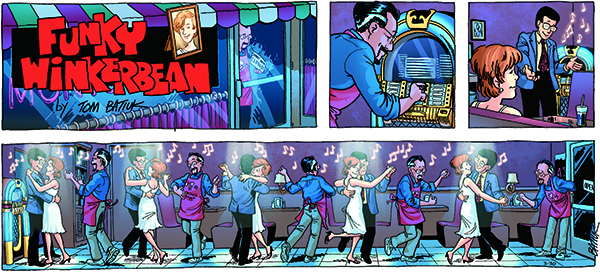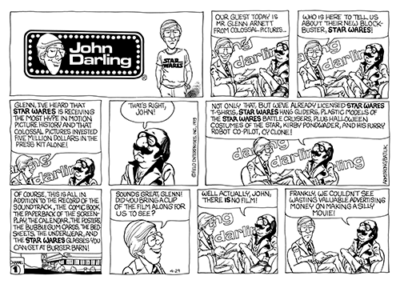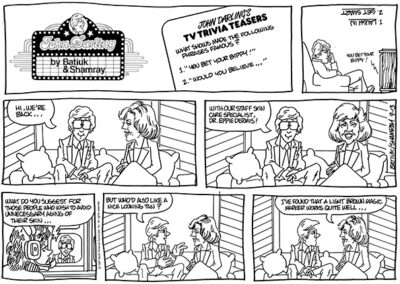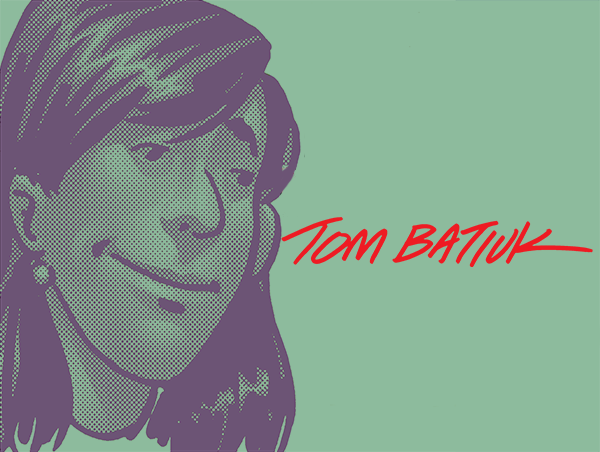
Things were a little bit nervy in the Funkyverse as the strip moved into 2008. For all intents and purposes, everything should have looked pretty darn rosy, but, in truth, that wasn’t quite the case. I had just experienced the success of Lisa’s Story and advanced my characters to their middle age, which you would think should open doors to myriad new and exciting writing possibilities. However, for the moment, that wasn’t exactly happening. Now, I realize it’s probably not the best form to begin an introduction with a disclaimer, and really what I have in mind is more of an explainer. In fact, I had already taken a swipe at explaining the situation in the introduction to The Last Leaf, the third book in the Lisa’s Legacy Trilogy. So I figured that I would take a look at what I had written before and rewrite it, tweaking and expanding on it as needed. But, upon rereading it, I thought: “Wow, I really nailed it! It’s perfect the way it is!” So, as I did once before, I’m invoking the Wally Wood rule (for those who missed it in Volume 10: “Never draw anything you can copy, never copy anything you can trace, never trace anything you can cut out and paste up.”) and presenting that material again here.
It was during the waltz that Lisa returned. The waltz was on a bootleg CD that a friend had sent me that winter. He had sent it because he knew I was recuperating from surgery on my foot and thought that it would help pass the time. Little did he know it, but he had thrown me a lifeline. A lifeline that would save me from myself.
I usually enjoy the winter, but that winter was an exception. The chill outside was matched by the chill I felt whenever I tried to enter the world of Funky Winkerbean. I had just wrapped up the very long and difficult story arc about Lisa’s battle with cancer. Following Lisa’s passing, and not wanting to spend a year in comic strip time mourning her loss, I did a time-jump, moving the lives of my characters ahead ten years. I had done this once before in the strip, and it had turned out to be nothing less than wonderful. This time, not so much. The first time I executed the time-jump with my cast of characters, it had been meticulously planned out, my readers alerted and stories prepared well in advance. With the first time-jump, I knew what was coming and how it would all culminate with Lisa’s story. This time, I had been way too casual about it and I was paying the price. When I looked beyond Lisa’s story, there was nothing but a void. My current high schoolers were gone, and the new students were strangers to me. Funky had opened a Montoni’s franchise in New York City, and nothing felt comfortable there. Nothing felt all that comfortable about Montoni’s back home either. I had an expat Afghan former insurgent running the place and . . . well, that was pretty much it. What had once been a welcoming stage for my characters now felt cold and empty. Even my third set piece, Les and Lisa’s house, was no longer a familiar setting—as single parent Les struggled to raise his now high school–aged daughter. Nothing felt quite right to me, and it wouldn’t be long before nothing felt right to my readers as well. I was not in a happy place.
Enter the CD. My friend had sent me a bootleg concert recording of a performer we both admired, but listening to it wasn’t doing much to quell the growing sense of panic I was starting to feel. And then I heard the waltz. The singer had transformed one of his older songs into a captivatingly beautiful waltz, which, thanks to modern technology, I was able, at the push of a button, to repeat over and over again. I did this for a really long time. We’re talking an afternoon here. It was during these repeated listenings that it happened. I began to picture Les and Lisa waltzing to the jukebox at Montoni’s. Dancing the full length of the room in one single-panel Sunday strip. Lovely. Which led to the first question: was Lisa real? Answer: no, of course not; Les was imagining her there. Which led to the second question: why was Les by himself in Montoni’s late at night? Answer: he has a daughter who would soon be going to college and, even with her sports scholarship, needs to augment his teacher’s salary by helping out Funky while he was at the New York Montoni’s, so he agrees to be the night manager. Question: sports scholarship? Answer: yes, Les, the nonathletic leader of the out crowd in his high school days, has a daughter athlete who’s the star of the girl’s basketball team, and it’s at the practices that he’ll eventually meet the mother of one of her teammates, annnnnd we were off and running.
From The Complete Funky Winkerbean Volume 13





